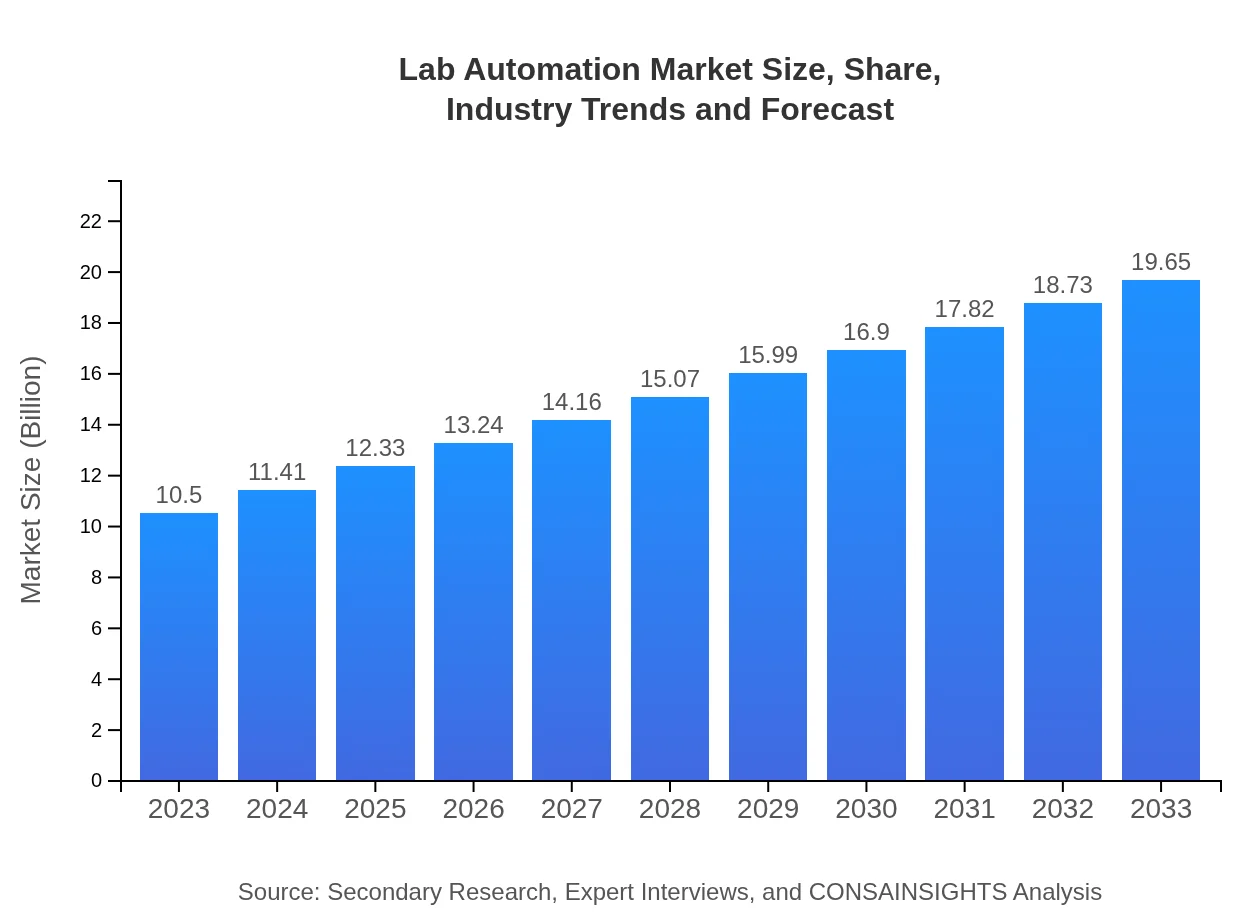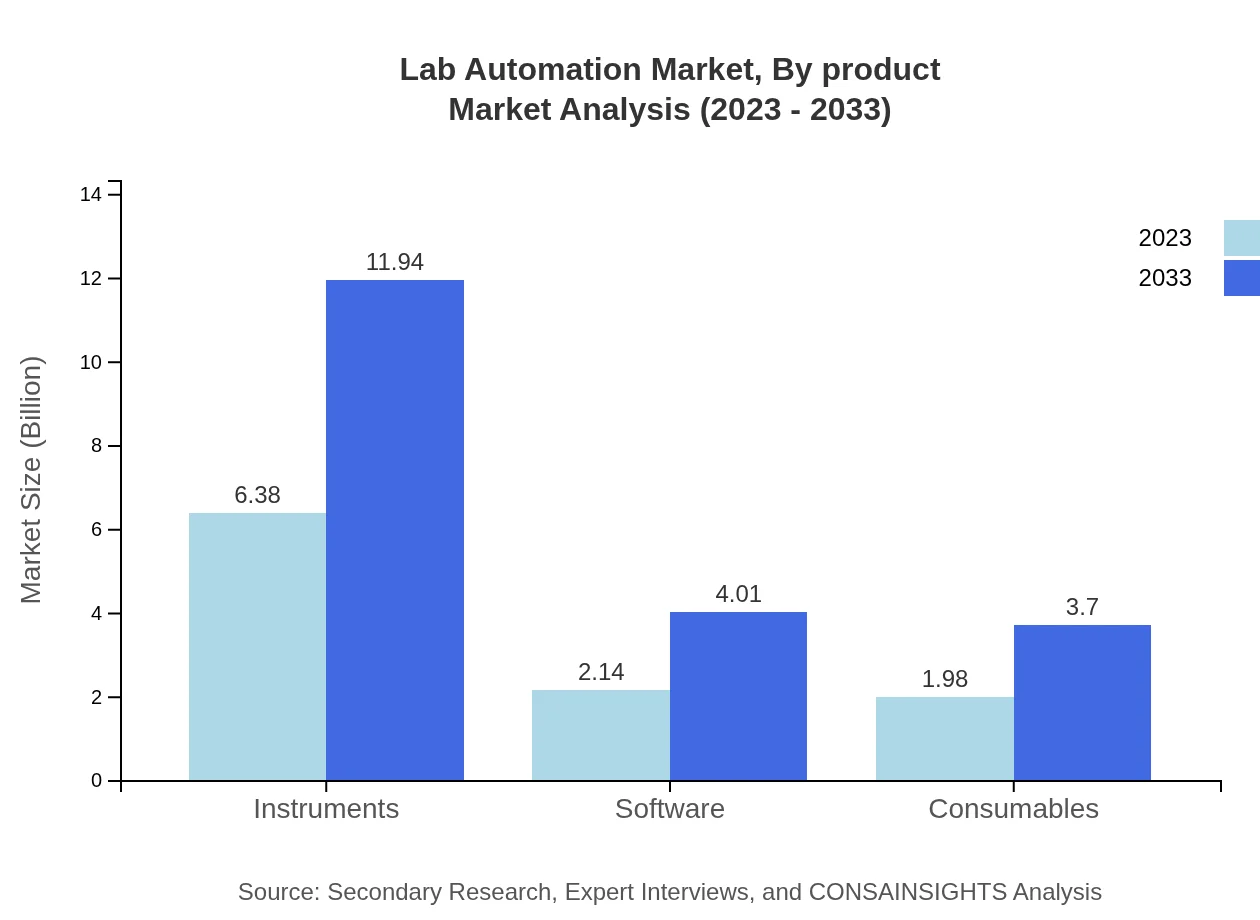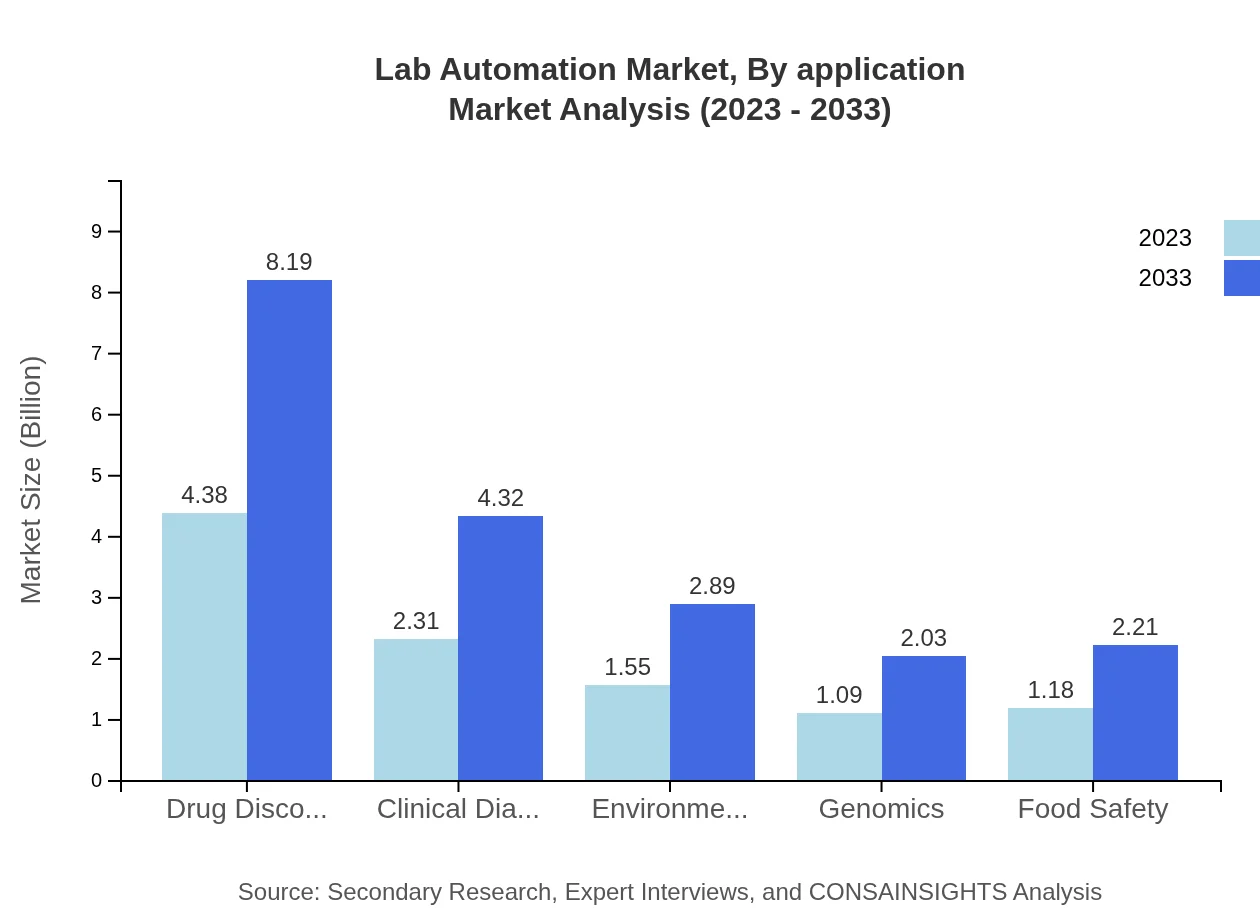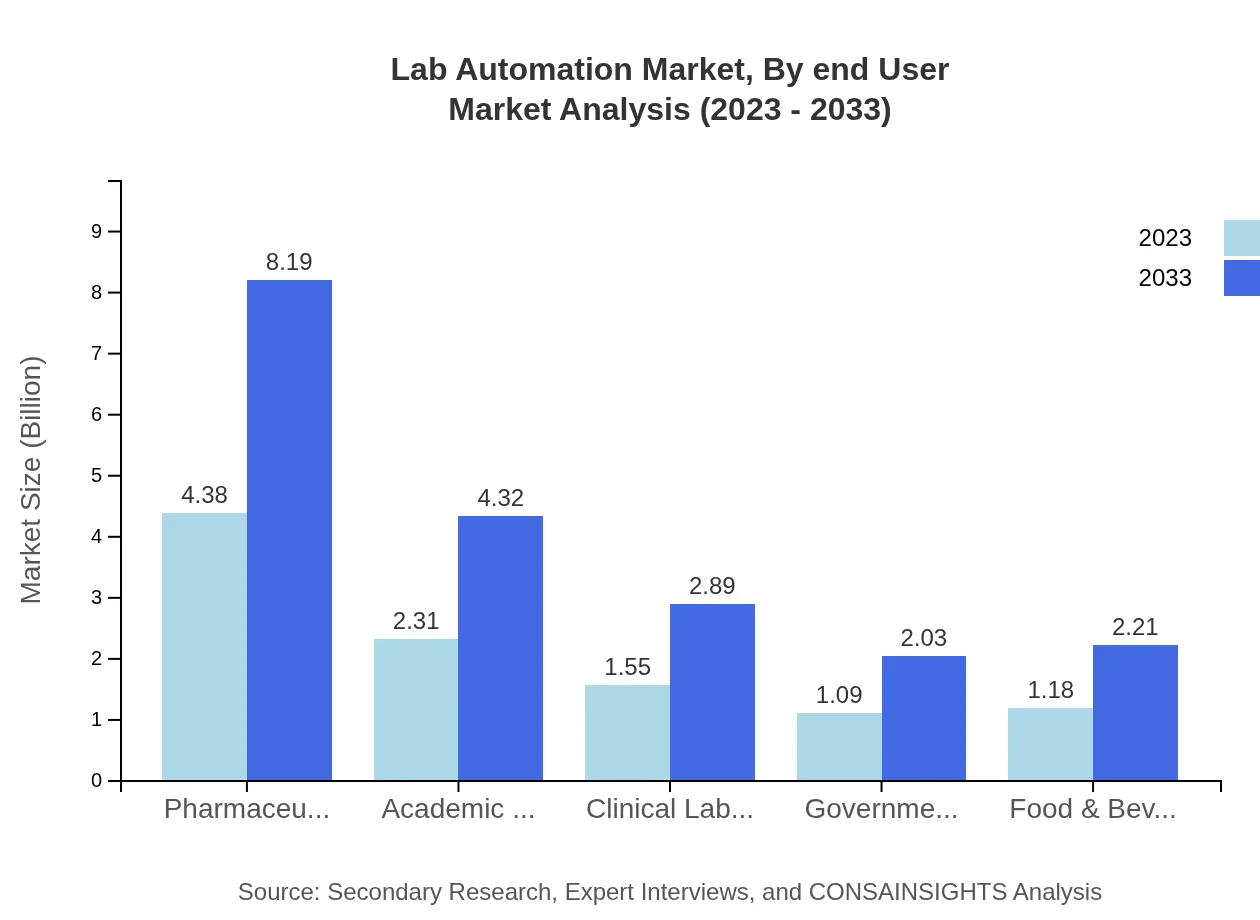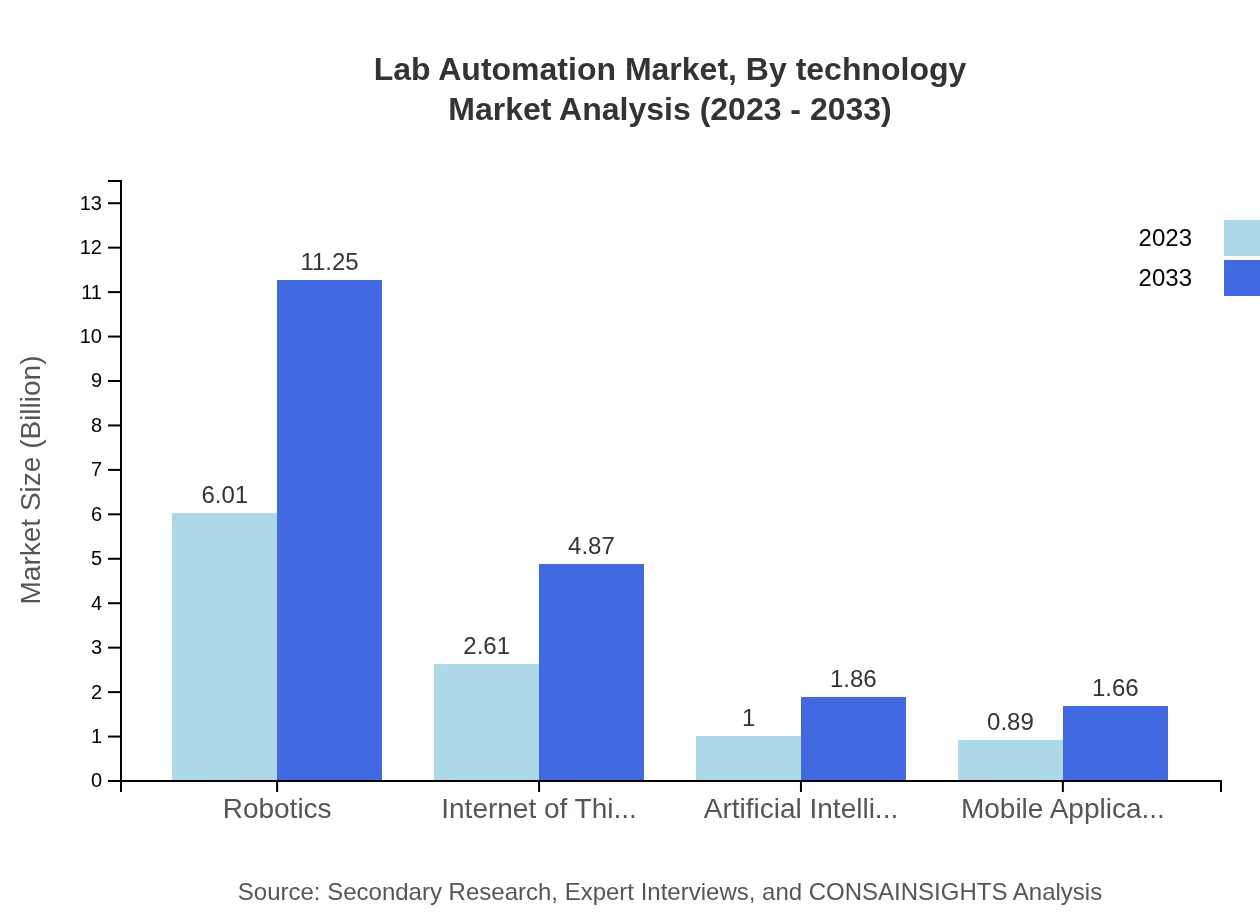Lab Automation Market Report
Published Date: 31 January 2026 | Report Code: lab-automation
Lab Automation Market Size, Share, Industry Trends and Forecast to 2033
This report provides a comprehensive analysis of the Lab Automation market from 2023 to 2033, detailing market trends, size, segmentation, regional insights, and key players, along with future forecasts and technological advancements that are shaping this industry.
| Metric | Value |
|---|---|
| Study Period | 2023 - 2033 |
| 2023 Market Size | $10.50 Billion |
| CAGR (2023-2033) | 6.3% |
| 2033 Market Size | $19.65 Billion |
| Top Companies | Thermo Fisher Scientific, Agilent Technologies, Beckman Coulter, Roche, Siemens Healthineers |
| Last Modified Date | 31 January 2026 |
Lab Automation Market Overview
Customize Lab Automation Market Report market research report
- ✔ Get in-depth analysis of Lab Automation market size, growth, and forecasts.
- ✔ Understand Lab Automation's regional dynamics and industry-specific trends.
- ✔ Identify potential applications, end-user demand, and growth segments in Lab Automation
What is the Market Size & CAGR of Lab Automation market in 2023?
Lab Automation Industry Analysis
Lab Automation Market Segmentation and Scope
Tell us your focus area and get a customized research report.
Lab Automation Market Analysis Report by Region
Europe Lab Automation Market Report:
Europe's Lab Automation market is poised to grow from $2.89 billion in 2023 to $5.42 billion by 2033. Countries such as Germany, France, and the UK are focusing on enhancing laboratory efficiency and implementing advanced automation solutions, driven by stringent regulatory requirements.Asia Pacific Lab Automation Market Report:
In the Asia Pacific region, the Lab Automation market is expected to grow from $2.01 billion in 2023 to $3.75 billion by 2033, driven by the increasing investment in laboratory infrastructure and rising adoption of automation technologies in countries like China and India. The growing biotechnology and pharmaceuticals sector in this region is significantly contributing to market expansion.North America Lab Automation Market Report:
North America leads the Lab Automation market with a size of $3.94 billion in 2023, projected to reach $7.38 billion by 2033. The region benefits from established biotech and pharma industries, ongoing R&D investments, and the presence of key market players, fostering a strong demand for lab automation technologies.South America Lab Automation Market Report:
The South American Lab Automation market is anticipated to grow from $0.38 billion in 2023 to $0.72 billion by 2033. Factors such as increasing focus on healthcare and efficient laboratory practices are propelling the demand for automation solutions in this region, particularly in Brazil and Argentina.Middle East & Africa Lab Automation Market Report:
In the Middle East and Africa, the Lab Automation market is expected to see significant growth, expanding from $1.27 billion in 2023 to $2.39 billion by 2033. The growth is primarily supported by improvements in healthcare infrastructure and rising investment in laboratory technologies across GCC countries.Tell us your focus area and get a customized research report.
Lab Automation Market Analysis By Product
The product segment consists of Instruments, Software, and Consumables. Instruments dominate the market with a size of $6.38 billion in 2023, forecasted to reach $11.94 billion by 2033, holding a share of 60.79%. The software segment, with a market size of $2.14 billion in 2023, is expected to grow to $4.01 billion, contributing 20.4% to the market. Consumables account for $1.98 billion in 2023, projected to grow to $3.70 billion with an 18.81% market share.
Lab Automation Market Analysis By Application
Applications in the Lab Automation market include Drug Discovery, Clinical Diagnostics, Environmental Testing, and Academic Research. Drug Discovery, being a significant segment, occupies 41.68% of the market with a size of $4.38 billion in 2023, rising to $8.19 billion by 2033. Clinical Diagnostics follows with a market share of 22%, growing from $2.31 billion to $4.32 billion. Other applications are also seeing growth due to increased laboratory automation needs.
Lab Automation Market Analysis By End User
The end-user segment encompasses Pharmaceuticals, Clinical Laboratories, Government Laboratories, and Food & Beverage. The Pharmaceuticals sector, which is a dominant player in the market, holds a 41.68% share with sales anticipated to rise from $4.38 billion in 2023 to $8.19 billion by 2033. Clinical Laboratories and Government Laboratories are also notable segments with shares of 14.73% and 10.35%, respectively.
Lab Automation Market Analysis By Technology
Key technologies impacting the Lab Automation market include Robotics, Internet of Things (IoT), Artificial Intelligence, and Mobile Applications. Robotics stands out with a market size of $6.01 billion in 2023, increasing to $11.25 billion by 2033, contributing 57.24% market share. IoT technology is also expanding its footprint, growing from $2.61 billion in 2023 to $4.87 billion. The integration of AI is becoming critical in enhancing automation processes, with a projected market size from $1.00 billion to $1.86 billion in the same period.
Lab Automation Market Trends and Future Forecast
Tell us your focus area and get a customized research report.
Global Market Leaders and Top Companies in Lab Automation Industry
Thermo Fisher Scientific:
Thermo Fisher Scientific is a leader in laboratory equipment and automation solutions, providing a wide range of products to enhance laboratory efficiency and productivity.Agilent Technologies:
Agilent Technologies specializes in analytical instrumentation and laboratory automation tools, contributing significantly to innovations in lab processes and workflows.Beckman Coulter:
Beckman Coulter focuses on laboratory instruments and automation solutions that improve laboratory workflow and reduce analysis times for clinical diagnostics.Roche:
Roche is known for its advanced offerings in lab automation, particularly in the fields of diagnostics and personalized healthcare driven by data insights.Siemens Healthineers:
Siemens Healthineers provides comprehensive laboratory automation solutions focused on delivering high-quality diagnostics and workflow efficiency.We're grateful to work with incredible clients.









FAQs
What is the market size of Lab Automation?
The Lab Automation market is valued at approximately $10.5 billion in 2023, with a projected growth at a CAGR of 6.3% until 2033, indicating robust expansion and increasing investments in automated laboratory solutions.
What are the key market players or companies in lab automation industry?
The lab automation industry is characterized by key players such as Thermo Fisher Scientific, Abbott Laboratories, Siemens Healthineers, and Agilent Technologies, which dominate the market with innovation and comprehensive product offerings.
What are the primary factors driving the growth in the lab automation industry?
Growth in the lab automation sector is primarily driven by technological advancements, increased demand for high-throughput laboratories, rising laboratory automation needs, and enhanced accuracy and efficiency in laboratory processes.
Which region is the fastest Growing in the lab automation market?
The North American region is the fastest-growing area in the lab automation market, projected to grow from $3.94 billion in 2023 to $7.38 billion by 2033, significantly outpacing growth in other regions.
Does ConsaInsights provide customized market report data for the lab automation industry?
Yes, ConsaInsights offers customized market report data tailored to specific needs and inquiries regarding the lab automation industry, accommodating various client requirements for in-depth insights.
What deliverables can I expect from this lab automation market research project?
Deliverables from the lab automation market research project include detailed market analysis, growth forecasts, competitive landscape assessments, and segmented data, ensuring comprehensive insights for decision-making.
What are the market trends of lab automation?
Current market trends in lab automation encompass increased integration of AI and IoT technologies, shifts towards modular lab setups, heightened focus on robotics, and an overall movement towards data-driven decision-making in laboratories.

